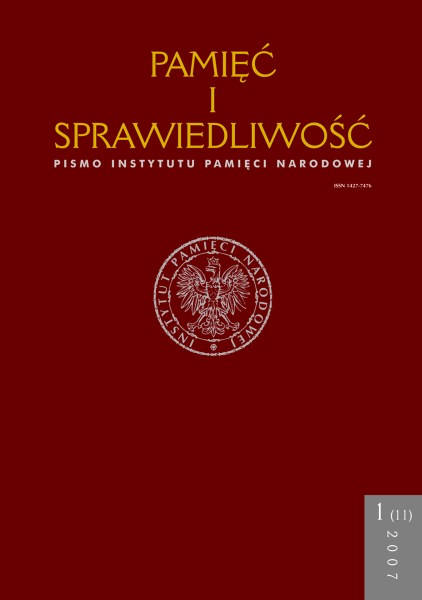Postawy młodzieży wobec przymusowego werbunku i pracy w brygadach Powszechnej Organizacji „Służba Polsce” w latach 1948–1955
Pamięć i Sprawiedliwość, Том 11 № 1 (2007), pages: 245-272
Publication date: 2007-12-30
Аннотация
For communists in Poland, especially in 1948–1956, shaping social and political attitudes of young people, the vast majority of whom were not connected with PPR/PZPR was one of the main aims crucial for creating totalitarian system from the top.
The model elaborated by Marian Spychalski assumed by the decree of February 1948 common and compulsory subordinating the youth by means of Common Organisation “Service for Poland” (PO SP) with the help of the military institutions. This was the status of labour brigades of PO SP, and until 1949 young people went for work singing “Rota” [Rota – (“Oath”) is a 20th-century Polish poem and anthem, the fi rst verse of which says “We’ll not abandon the land of our folk”]. This is the way Władysław Gomułka imagined creating new labour class. One should remember than the vast majority, that is 73% of these young
people lived in the country, and before the 6-year Plan was realised, urban youth had made only 27% of the population. Statistically, the output of PO SP, which was dissolved in 1955, had been impressing. According to the offi cial data, almost
1.000.000 of youngsters worked in SP brigades, and 120 000 continued their education in vocational schools.
Parents of these people associated work in SP brigades with forced labour for the Third Reich. In 1948 youngsters brought with them suitcases full of food, because it was thought that in the brigades the Lenin rule of no meals for those unable to work would be introduced. Parents as well as their children tried in both
legal and illegal ways postpone recruitment to the brigades. Mass interventions of school authorities, institutions, plants, sport associations mushroomed, all these organisations were issuing releasing certifi cates without any important reason. Young people with the help of their environment escaped recruitment by changing their address or job, or just declared to pay a bribe. In the country it was popular to hide in the forest. Urban youth would rather volunteer to brigades in which their stay could be the shortest, for example to agricultural ones.
 Język Polski
Język Polski
 English
English
 Deutsch
Deutsch
 Français (France)
Français (France)
 Italiano
Italiano
 Русский
Русский


 PDF (Język Polski)
PDF (Język Polski)
